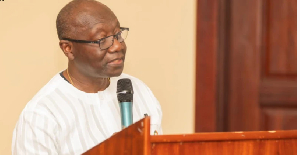The Driver and Vehicle Licensing Authority (DVLA) has been ranked the most corrupt institution in the Kumasi metropolis, according to a survey report by the Ghana Integrity Initiative (GII) Consortium.
The survey to assess citizens’ knowledge, perceptions and actual experiences of corruption was conducted between April and May 2016.
Over 85.9 percent of respondents in the nation’s second largest city rated the DVLA as the most corrupt institution.
It is followed by the Passport Office, the private sector, public officials and the political parties in that order.
The military was seen by 59.7 per cent of the citizens as not corrupt while 51.8 and 51 per cent said same about the media and NGOs, respectively.
Mr. Samuel Harrison-Cudjoe, a Research Officer of the Ghana Anti-Corruption Coalition (GACC), presented the findings at forum held in Kumasi.
In attendance were officials from the Kumasi Metropolitan Assembly (KMA), security agencies, Commission on Human Rights and Administrative Justice (CHRAJ), Judicial Service and the religious bodies.
The report indicated that 95 per cent of the 40.3 per cent of people who made contact with the police reported paying bribe to the officers.
The Customs Division of the Ghana Revenue Authority (GRA) also had 9.5 per cent of citizens making contact with them in the last 12 months with 86.6 per cent paying bribe.
In a similar survey in the Asante-Akim Central Municipality, the police service came top of the ranking, followed by the judiciary with the Ghana Education (GES) placing third.
Mr. Kwasi Boateng Asumeng, Programmes Manager of GACC, said four out of every five people captured in the survey had come into contact with the police for one reason or the other.
A third out of the number admitted paying bribe in their encounter with the police.
Mr. Harrison Cudjoe, a representative of GII, said the report provided district specific evidence as basis for engaging district level government institutions and stakeholders to help reduce corruption at the sub-national level.
The survey was carried out in 48 other selected districts across the 10 regions and is part of the four-year United States Agency for International Development (USAID) funded project called “Accountable Democratic Institutions and Systems Strengthening (ADISS)”.
ADISS seeks to renew and build upon on-going efforts and also increase the capacities of anti-corruption civil society organizations to motivate citizens to apply pressure on policy makers and institutions through a number of targeted and focused actions with the aim to reduce corruption.
Business News of Wednesday, 14 June 2017
Source: GNA













